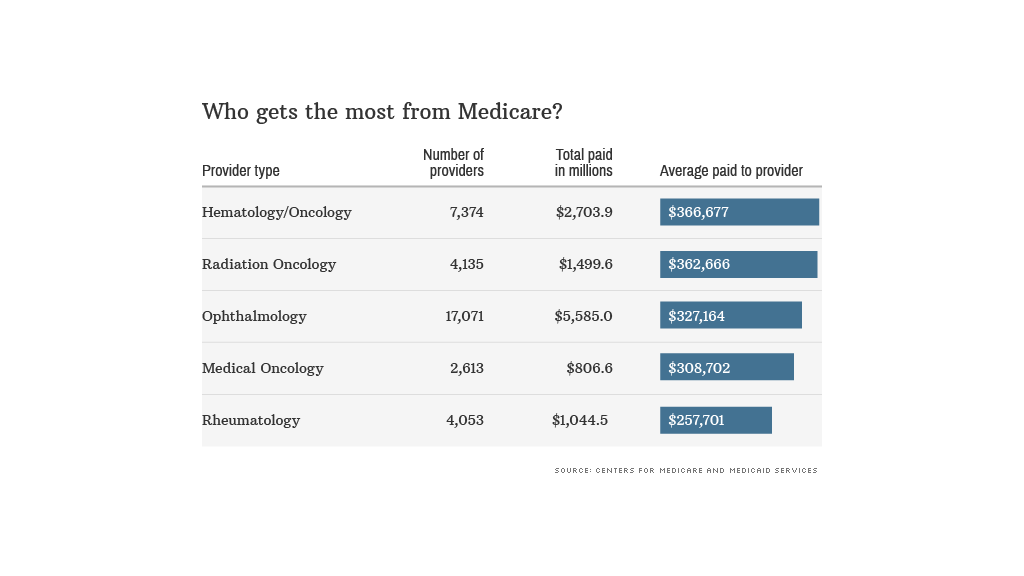
Some doctors are making millions of dollars off of Medicare, with a handful collecting multi-million payments annually.
One ophthalmologist from West Palm Beach, Fla., collected nearly $21 million, while a cardiologist from Ocala, Fla., received $18 million in 2012. Seven doctors pulled in more than $10 million in payments, while nearly 4,000 are Medicare millionaires.
The doctors' payments were part of an unprecedented data release, which covers 880,000 physicians, therapists, labs and other medical facilities. Medicare paid providers a total of $77 billion in 2012 to care for more than 50 million of the nation's elderly and disabled, according to federal statistics released Wednesday. These figures do not include what doctors collect from patients in co-pays or from private insurers for non-Medicare patients.
The data release marks the first time the government has made public detailed information on the services and procedures provided to Medicare patients by individual doctors. It also shows what health care professionals billed the government and what they were paid.
A small share of doctors account for a large percentage of payments. The top 2% of physicians collected nearly a quarter of Medicare payments. Ophthalmologists, cardiologists and blood cancer doctors were the most represented among this group, both in terms of numbers and payments from Medicare.
About 16% of the highest-compensated doctors were in Florida, with 12% in California and 9% in Texas.
The American Medical Association had long battled to keep this data private, arguing it could be misconstrued, but a federal judge last year lifted the injunction. The Centers for Medicare and Medicaid Services, as well as other experts, cautioned against drawing conclusions based purely on the numbers.
For instance, the data doesn't reveal the conditions of the patients. Also, doctors don't always get to keep the entire payment since they may have to reimburse drug companies or other providers for part of the service.
This is one reason why oncologists and ophthalmologists rank so high, said Medicare officials. These doctors often use expensive drugs in their treatments. Medicare pays the doctor 106% of the cost of the drug. The physician pays the pharmaceutical company for the medication, but keeps the additional amount for himself.
Blood cancer doctors were among the highest paid, receiving an average of $367,000. Ophthalmologists also reaped in big bucks, collecting $327,164, on average. Cardiologists and nephrologists, who deal with kidney disease, were also near the top of the ranks.
Federal officials said they are releasing the data to bring more transparency and accountability to Medicare billing and payments. They are also hoping the public will use the information to help fight fraud.
"Currently, consumers have limited information about how physicians and other health care professionals practice medicine," said Health Secretary Kathleen Sebelius "This data will help fill that gap by offering insight into the Medicare portion of a physician's practice."

CMS released similar information on hospitals last year, which allowed consumers to compare what hospitals charge for common inpatient and outpatient services nationwide.
The doctors' data release follows a Department of Health and Human Services' Office of Inspector General report last year that warned about fraud concerns among high billers.
The inspector general report looked at the $65 billion Medicare paid out in each year between 2008 and 2011. Approximately 2% of physicians were responsible for almost 25% Medicare payments, each pulling in more than $500,000 annually.
The inspector general found that of the 303 doctors who each provided more than $3 million of services in 2009, more than 100 were flagged for improper payment reviews. Three had their medical licenses suspended and two were indicted. And reviewers found overpayments of more than $34 million.
The primary specialties subjected to the reviews included internal medicine, radiation oncology and ophthalmology. More than a quarter of the doctors practiced in Florida, with others in California, New Jersey and Texas also ranking among the top.
Medicare officials said they use various tools, including office visits, to investigate suspicious billers. Recovery of overpayments is at an all-time high, said Jonathan Blum, principal deputy administrator at the center.


